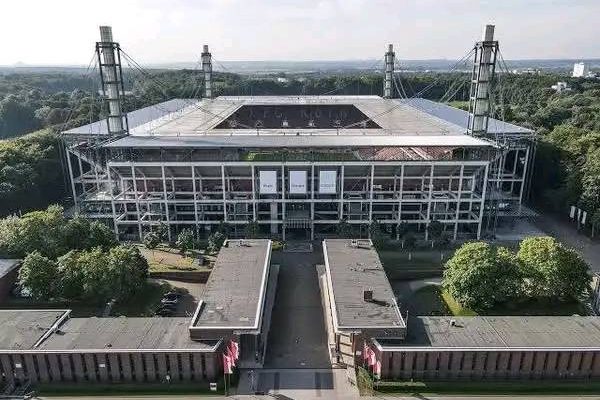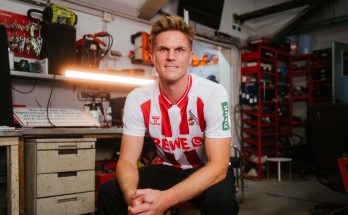A thunderbolt has struck German football, and its epicenter is none other than Cologne. The announcement has already sent tremors through the Bundesliga and beyond: 1. FC Köln has officially unveiled an ambitious expansion project for the legendary RheinEnergieSTADION, a plan so bold and futuristic that it promises to transform the ground into something far greater than a football stadium. Forget simple modernization or routine upgrades; this is a statement of intent, a vision that combines tradition, emotion, and forward-thinking ambition in one colossal package. For decades, the RheinEnergieSTADION has been a cathedral of football, a place where fans lived through soaring highs and painful lows, always with passion. Now, with this project, it is set to become a true monument to Cologne’s determination to cement its place not just in German football, but on the grand stage of Europe.
What makes this expansion so striking is the clarity of the message. Cologne is not content to be a club defined by fleeting success or relegation battles, but one that builds a foundation strong enough to consistently rival the elite. The city, the fans, and the club have long lived in the tension between tradition and modernity, always proud of their identity but often limited by infrastructure and finances. Now the vision is different. This project is not a cosmetic touch-up—it is a leap, a rocket launch into a new dimension that redefines what Cologne football means in the twenty-first century. From the architecture to the fan experience, from commercial opportunities to sporting infrastructure, everything about the plans screams ambition, scale, and permanence.
The essence of the project lies in its massive expansion blueprint. While stadiums around Europe often chase modernization in sleek, sterile ways, Cologne’s idea is deeply rooted in the culture of its supporters. The first details highlight not just more seats or better amenities but a stadium that becomes a living, breathing organism of football culture. The expansion will reportedly increase capacity to accommodate tens of thousands more fans, ensuring that the famous Cologne atmosphere—already among the most celebrated in German football—reaches an even more deafening crescendo. Opponents already fear coming to Cologne; soon they may dread it. With every roar multiplied, every chorus of the club hymn amplified, RheinEnergieSTADION could become one of the most intimidating grounds in Europe.
But it goes far beyond the numbers. The modernization aims to create a holistic fan experience that rivals the biggest arenas of European football, from the Allianz Arena in Munich to the Santiago Bernabéu in Madrid. Cologne understands that football today is not just about ninety minutes on the pitch but about everything surrounding it: the pre-match anticipation, the halftime interaction, the post-game celebration. Plans include improved hospitality areas, cutting-edge technology, digital connectivity, and sustainable infrastructure. The club is putting emphasis on green energy solutions, waste reduction, and environmental responsibility, ensuring that the stadium becomes not only a fortress of football but also a symbol of future-conscious thinking. For a city with deep roots in culture and creativity, it is a perfect marriage of tradition and progress.
The statement that Cologne is making is as much about football politics as it is about infrastructure. For years, discussions around the so-called “big clubs” in Germany revolved around Bayern Munich, Borussia Dortmund, and occasionally RB Leipzig. Cologne was admired for its fan culture, for the passion of the “Effzeh” faithful, but rarely was it mentioned as a long-term challenger to the top. This project changes that narrative. By expanding and modernizing its stadium to world-class levels, 1. FC Köln is signaling that it is ready to join the conversation of power. It is a battle cry to the Bundesliga: Cologne has come to stay, and it intends to shape the future rather than merely react to it.
The ripple effects are enormous. Economically, the expansion is expected to generate vast new revenue streams for the club, from ticket sales to hospitality, events, and international exposure. Cologne, a city already famous for its carnival, cathedral, and cultural heartbeat, will now boast one of the most impressive football stadiums in Europe. Tourism will benefit, businesses will profit, and the city’s identity will be strengthened. Football is not just sport here—it is part of the social fabric, and by making RheinEnergieSTADION a centerpiece of this identity, Cologne aligns itself with the great football cities of Europe, from Barcelona to Manchester.
For the fans, this is nothing less than a dream come true. Generations of Cologne supporters have lived through heartbreak, relegations, and near-misses, but always with loyalty and passion. They have seen their club bounce back time and time again, often against the odds. Now, instead of simply hoping for stability, they are being given a vision of dominance and pride. Imagine the atmosphere when 60,000, 70,000, or even more fans fill the new stadium, waving flags, singing songs, and carrying the team with their energy. The expansion is not just about seats; it is about amplifying the emotional bond between the city and its team. Every brick laid and every beam erected is a tribute to those fans, a testament to their undying support.
Naturally, such ambition also raises questions. The financing of the project will be scrutinized, as will the balance between preserving the soul of the club and embracing commercial realities. Cologne has always prided itself on being a people’s club, one that belongs to the community rather than faceless investors. The challenge now is to ensure that the expansion serves both purposes: building global stature without losing local authenticity. From the early presentations, it appears that the club is keenly aware of this tension. Efforts are being made to keep ticket prices accessible, to involve fan groups in planning, and to ensure that the soul of Cologne remains intact even as the stadium grows into something spectacular.
Symbolically, the choice to announce this project now could not be more powerful. German football is in a moment of change, with new financial models, international ambitions, and technological revolutions shaping the game. Cologne is saying, loud and clear, that it will not be left behind. On the contrary, it intends to lead. The phrase “mega-rocket launch into a new dimension” is not just rhetoric—it captures the urgency and energy of the club’s ambition. For years, Cologne was known as a sleeping giant, a club with huge potential but limited means. With this expansion, the giant is not just waking—it is roaring.
There is also a deeper cultural resonance. Cologne is a city that thrives on emotion, togetherness, and spectacle. Its carnival is one of the most famous in the world, its cathedral one of the most iconic landmarks in Europe. Football here has always been more than sport—it is a continuation of that cultural DNA. The expansion of RheinEnergieSTADION into a true cathedral of football mirrors the city’s identity. Just as the Dom rises above the skyline as a symbol of permanence and pride, the new stadium will stand as a modern monument to passion, resilience, and ambition. Visitors from around the world will not just see a football match; they will experience Cologne’s essence.
As the first details of the plan spread, excitement has mixed with curiosity. What will the new stands look like? How will the acoustics amplify the chants of the Südkurve? What kind of technology will redefine the matchday experience? Every small reveal becomes part of a bigger narrative: Cologne is not just upgrading, it is revolutionizing. Fans debate whether this will put the club closer to competing in Europe regularly, whether it will help attract bigger players, or whether it will give the team the edge in high-pressure matches. The truth is, infrastructure alone does not win trophies, but it creates the foundation upon which success can be built. By making such a bold move, Cologne is giving itself the platform to dream bigger and achieve more.
There will be hurdles along the way. Construction projects of this scale inevitably face delays, costs, and logistical headaches. The Bundesliga is competitive, and Cologne must also ensure that its sporting progress matches its infrastructural ambition. Yet the symbolism of this announcement cannot be underestimated. It is a declaration that Cologne refuses to be defined by its limitations. Instead, it chooses to define itself by its aspirations, by its courage to take risks, and by its unshakable belief in the future.
German football thrives on its diversity of clubs, fan cultures, and identities. Cologne’s expansion project adds a new, exciting chapter to this tapestry. It challenges Bayern, Dortmund, and Leipzig to take note, and it invites European clubs to see Cologne not as a charming underdog but as a rising force. It is an electrifying moment for the Bundesliga, a spark that could ignite new rivalries and reshape the balance of power.
A thunderbolt has indeed struck German football, and its light shines from Cologne. The RheinEnergieSTADION, long a place of passion, is about to become a monument of ambition. 1. FC Köln has thrown down the gauntlet: it is here to stay, it is thinking bigger than ever, and it dares to dream in cathedral-like dimensions. The project is more than steel, glass, and concrete—it is the embodiment of hope, determination, and belief. Cologne has spoken, and the message is clear: the future belongs to those bold enough to build it.


